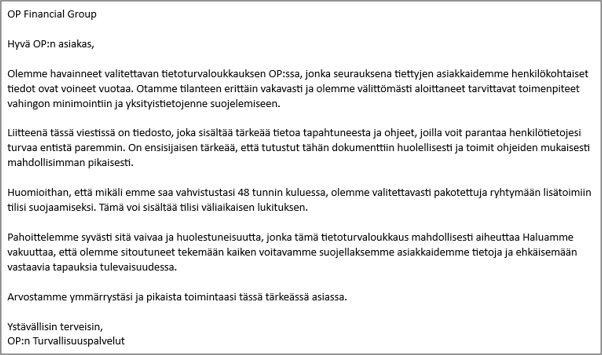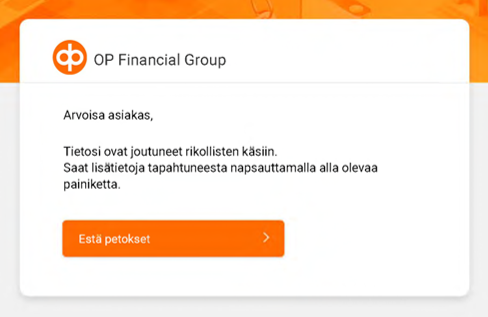A scam is circulating right now in which criminals are sending out phishing messages by email. The messages claim that the reader's data security has been breached and instruct them to open an attachment file.
The attachment opens a new message that contains a link to a scam website that resembles an online bank login page. If you attempt to log in, your online banking user ID and password will fall into the hands of criminals. The scammers will use these to hijack the victim's Mobile key.
If you receive a message like this, do not open any attachment files or links to the scam website. Do not enter your user ID and password on such websites.
The scam messages may look like this:

The message that opens from the link may look like this:

Because cybercriminals often change the content of their scam messages, other kinds of messages may also be in circulation.
If you suspect that your user ID has fallen into the wrong hands, deactivate your user ID by calling 0100 0500 (personal customers) or 0100 05151 (corporate customers). When our Customer Service is not available, please call the OP Deactivation Service at +358 100 0555. It is available 24/7. Also remember to call our Customer Service during service hours to report the incident.
This is how our messages differ from scam messages
We will never send you messages with a link to the online bank's login page. Your bank will never ask you about your user ID or card details through messages. Such messages are scams – do not click on the links in the messages.
Even when receiving or cancelling a payment, you do not need to log in via a link, confirm with codes, or give your details. If you are asked to do this, contact the bank's Customer Service.
Please remember these seven things when banking online
- Do not go to the op.fi service through a link you have received or a search engine. The message directing you to the login page is a scam. You may end up in a scam website through search results on Google, Bing or another search engine too, so type the address on the browser’s address bar yourself.
- Check the address. Always make sure that you are at www.op.fi. Do not enter your identifiers into a site if you are not sure that it is genuine.
- Keep your user ID and password to yourself. The bank will never ask you to provide your user ID over the phone or by SMS or email.
- Do not open email or SMS attachments sent in the bank’s name. Check with your bank’s customer service that the attachments are genuine.
- If a person you don’t know asks you to install an application, do not do so. Install any software you need through your device’s app store.
- Do not confirm transactions you are not certain you have made yourself. Always read the confirmation requests with due care – if there is anything that does not match, do not confirm anything.
- Please ask if you are unsure about anything. If a contact or message is suspicious, or the op.fi service page is not working in the usual way (for example, login with Mobile key is not working), please contact your bank before doing anything else.